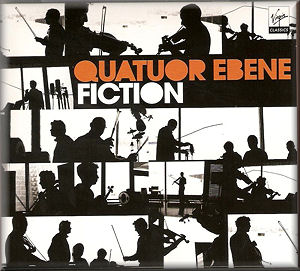Misirlou [3:09]
Amado mío [4:25] º
Nature Boy [3:33]
Come together [3:06]
Unrequited [6:03]
Calling you (intro) [2:35]
Calling you [6:22]
Corcovado [3:23] ¹
Nothing Personal [6:49]
Footprints [8:47]
Lilac Wine [4:51] ²
Smile [5:35]
Some Day My Prince Will Come [3:51]
Somewhere Over the Rainbow [6:47] ³
The Day Of from Ocean's 12 [4:39]
Streets of Philadelphia [5:38]
Stacey Kent ¹
Natalie Dessay (soprano) ²
Fanny Ardant ²
Luz Casal º
Quator Ebène with Richard Héry (drums)
rec. Novemeber 2009, Studio de la Grande Armée, Paris (Natalie Dessay
track); December 2009 (Fanny Ardant track); April 2010 (Luz Casal
track), April 2010, Curtis Schwartz Studios, Ardingly (Stacey Kent
track); December 2009, Parc Vulcania, Saint-Ours, Les Roches (remainder)
I reviewed the Ebène Quartet’s award-winning Fauré-Ravel-Debussy disc, finding it attractive, though less impressive than some other critics. Now they’ve turned to another metier, one in which they are well versed, and serve up jazz, soundtrack and pop tunes, some of which see them paired with some illustrious cross-disciplinary associates and collaborators.
There’s much to enjoy here, given that this French quartet is not a stiff classical ensemble out for a mindless jaunt in crossover territory. Misirlou from Pulp Fiction manages to exude a Piazzollan ethos and flamenco drive, whilst Amado mío is a slinky number enhanced by Luz Casals, who dons Rita Hayworth’s luxuriant locks. Eager pizzicato and percussion animate the exciting and propulsive take on Nature Boy whilst Come Together is subject to a clever arrangement with alternating arco and pizzicato writing. The group shows good taste in selecting Unrequited as a vehicle whilst Calling you (intro) features a drum solo by Richard Héry and the filmic atmosphere is, once again, a fine motor for the atmospherics conjured up by the canny arrangements and performances, which are always mobile, inventive and on the move.
A thrumming accompaniment supports the unique talent of Stacey Kent as she sings Jobim, but even more interesting is the playing in Nothing Personal which ranges from a cadential violin solo, to up-tempo doubling, and an almost klezmer-like widening of the vibrato, along with the manifest folkloric infusions. Footprints is the longest track and is supply and subtly played, and Lilac Wine with Fanny Ardant is all tremolandi and a very Gallic sense of itself. Chaplin’s Smile brings out the Grappelli in the group, its ultra-romantic ethos appropriately broad, though the actual burden of the melody is not on the violin but Raphaël Merlin’s cello. It’s nice to hear a waltz in Some Day My Prince Will Come – and vocals from ‘the band’ – and equally so to hear Somewhere Over the Rainbow sung by Natalie Dessay; lovely warm, rich accompaniment. A touch of Steve Reich infiltrates the quartet playing in the last track, Streets of Philadelphia.
This disc has been thoughtfully compiled, and the arrangements are malleable and appropriate. The guests enhance the cohesion of the programme rather than detracting from it, or seeming precious. I daresay it’s a bit of a ‘between two stools’ kind of a disc. Jazz fans will shun it for not being jazzy enough and classical mavens won’t welcome its populist touch. But give it a try and I think you’ll enjoy it.
Jonathan Woolf
